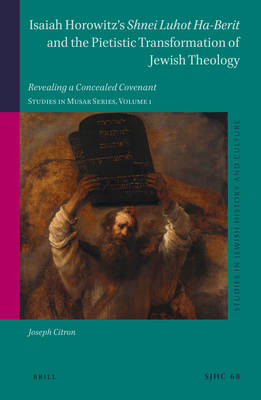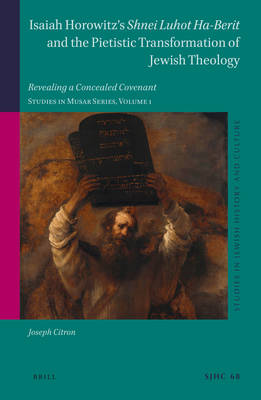
- Afhalen na 1 uur in een winkel met voorraad
- Gratis thuislevering in België vanaf € 30
- Ruim aanbod met 7 miljoen producten
- Afhalen na 1 uur in een winkel met voorraad
- Gratis thuislevering in België vanaf € 30
- Ruim aanbod met 7 miljoen producten
Zoeken
Isaiah Horowitz's Shnei Luhot Ha-Berit and the Pietistic Transformation of Jewish Theology
Joseph Citron
€ 227,45
+ 454 punten
Omschrijving
In this book, Joseph Citron offers the first comprehensive analysis of Prague Rabbi Isaiah Horowitz's (c.1565-c.1626) magnum opus of Jewish ethical literature, the Shnei Luhot Ha-Berit. Citron's close philological analysis reveals the pioneering nature of the work in creating an organic Jewish theological system rooted in the mystical structures of Kabbalah, cultivating an orthodoxy in thought and legal practice based upon its principles. It provided a platform for laypeople to attain great spiritual heights by emphasising that God could be served and cleaved to through mundane activity, and that Judaism demanded deep emotion and joy as much as Talmudic erudition or meticulous observance. The Shelah's paradigms significantly influenced 17th-century Sabbatean movement, the 18th-century Hasidic movement, and Jewish Orthodoxy in the 19th century. The book is essential for scholars and laypeople alike wishing to understand the evolution of Judaism in Central and Eastern Europe in the early modern period.
Specificaties
Betrokkenen
- Auteur(s):
- Uitgeverij:
Inhoud
- Aantal bladzijden:
- 318
- Taal:
- Engels
- Reeks:
- Reeksnummer:
- nr. 68
Eigenschappen
- Productcode (EAN):
- 9789004461116
- Verschijningsdatum:
- 23/09/2021
- Uitvoering:
- Hardcover
- Formaat:
- Genaaid
- Afmetingen:
- 156 mm x 238 mm
- Gewicht:
- 498 g

Alleen bij Standaard Boekhandel
+ 454 punten op je klantenkaart van Standaard Boekhandel
Beoordelingen
We publiceren alleen reviews die voldoen aan de voorwaarden voor reviews. Bekijk onze voorwaarden voor reviews.








